-
Key Takeaways
- The AI growth in commercial real estate is rapidly accelerating at a projected CAGR of 36.1%, reaching $303.06 billion by 2025, with significant buy-in from most segments of the industry.
- The results from AI usage in commercial real estate are tangible, with reductions of 40-60% in maintenance costs, energy savings from tapping into AI were reported at 25-35%, and average productivity gains, which can be attributed to AI and other efficiencies across real estate organizations, are 7.3%.
- AI-powered market prediction systems can forecast price trends within the real estate market at a rate of 85-92% accuracy, allowing real estate developers to make data-driven investment decisions and reduce overhead associated with project development and timing.
- Generative AI is helping establish smart building technology resulting in autonomous, adaptive properties that optimize energy use, anticipate maintenance needs, and develop customized experiences for tenants.
How AI in Real Estate Development Is Driving a Paradigm Shift
Find out how AI real estate development is transforming the industry with market expansion. This in-depth guide uncovers 16 real-world AI applications, ranging from predictive analytics that deliver 85-92% accuracy to cost-saving smart buildings delivering 40-60% cost savings, supporting developers in becoming competitive through data-driven decision-making and automation.
AI in Real Estate Development
The real estate industry is at the tipping point of a technological revolution. AI in real estate development is a new force that is fundamentally changing how properties are built, managed, and sold, affecting every stage of the real estate lifecycle from early planning and development to property management and customer service.
AI is transforming the real estate sector, delivering efficiencies in sales, management, and infrastructure, with potential savings of $34 billion by 2030. The use of artificial intelligence in real estate development represents not only the evolution of technology in the industry, it represents a total paradigm shift toward a data-driven decision-making culture, automated processes, and improved customer experience.
Overview of AI's impact on the real estate industry
The analysis from the Business Research Company, the AI in real estate market size is expected to grow from $222.65 billion in 2024 to $303.06 billion in 2025, at a compound annual growth rate (CAGR) of 36.1% demonstrating the pace of AI real estate solutions across the industry and for all segments.
Importance of AI in modern real estate development
The significance of AI in contemporary property development is difficult to exaggerate. The previous approaches used in property development frequently relied on personal intuition, limited amounts of data analysis, and tedious, manual (often error-prone) processes. AI systems of today provide access to exceptional levels of accurate, speedy, and insightful information, which developers can utilize to make informed decisions, minimize risk, and maximize operations on all levels.
Machine Learning algorithms analyze vast datasets to identify patterns, forecast elements of a market, and optimize the allocation of resources. AI systems can analyze information from various sources in real-time, including market data, demographic trends, economic indicators, and consumer behavior trends, providing entirely new insights that were previously unattainable without AI and big data technologies.
Also Read:
Top 8 Use Cases of AI Chatbots in BusinessBenefits of AI in Real Estate Development
AI application in real estate development provides tangible benefits on several operational fronts. Some of these benefits are better decision-making through data analytics, better operational efficiency through automation, better customer experiences through customized services, reliable market forecasting with the help of machine learning algorithms, and effective risk management strategies protecting investments and project success.
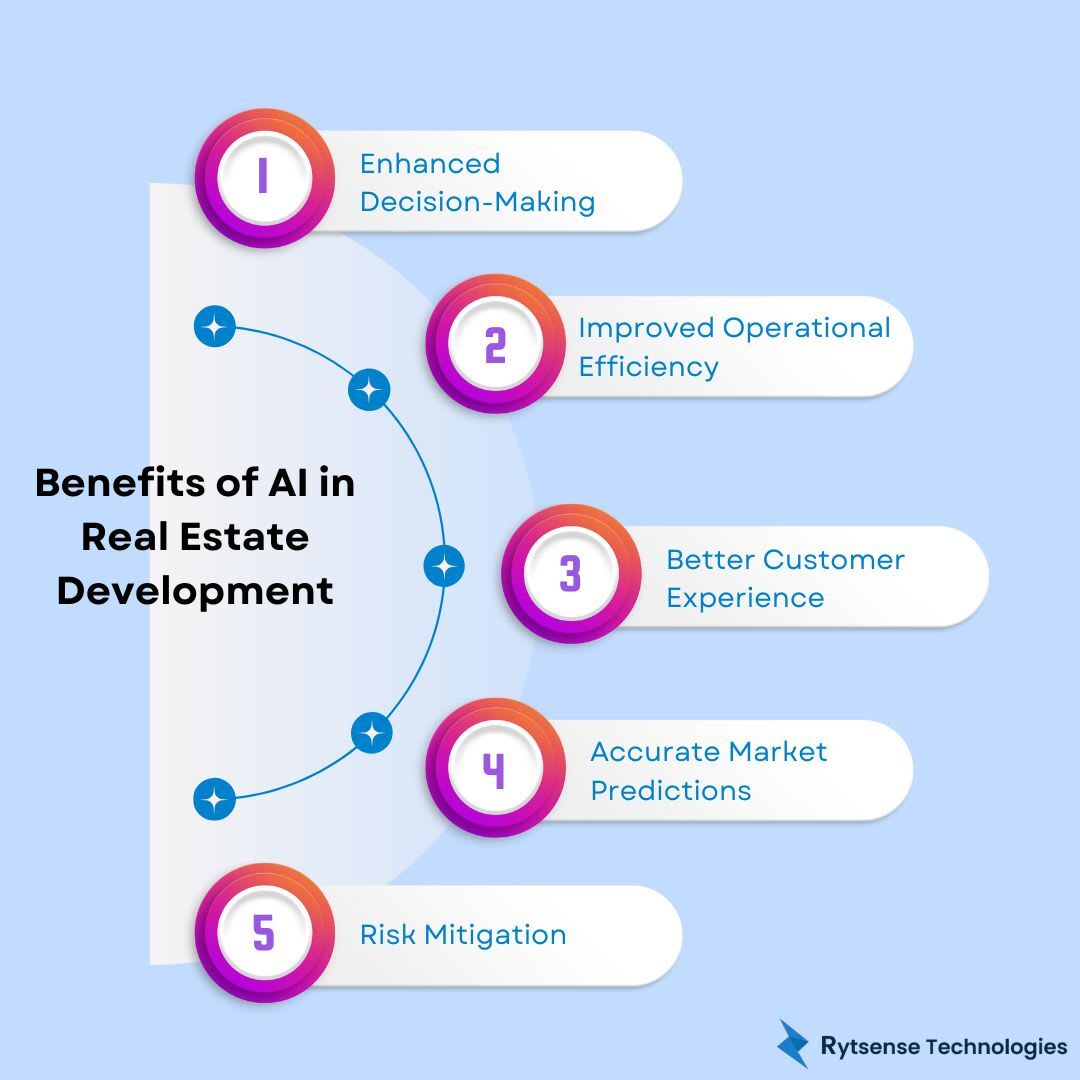
Enhanced Decision-Making
AI-supported decision-making in the development field has changed how decisions are made through entire development process. Advanced algorithms can analyze intricate datasets to provide actionable insights to support decision-making for more critical aspects of a development, such as the choice of location, property design, pricing, and timing.
The algorithm can also analyze historical data, evaluate the current market conditions, and review predictive indicators to recommend development considerations or strategies. Previously, real estate development relied heavily on guesswork and generalizations; AI data-driven real estate insights have dramatically shifted this paradigm.
Improved Operational Efficiency
Automated real estate processes decrease the time and resources necessary for various development tasks. These systems will make workflows more effective, remove duplicative work, and assign subcontractors to tasks from the first feasibility study to the filing of the final paperwork.
AI in construction management is tremendously beneficial. This system can monitor work being done, and report any delays. Inside, AI can track materials and inventories, as well as facilitate the coordination of the overlapping trades of many subcontractors. Automation decreases costs, provides for better scheduling, and assures better quality control.
Better Customer Experience
The AI-enhanced customer experience in real estate has revolutionized the way potential buyers and tenants shop for new listings or interact with developers. With recommendations powered by artificial intelligence, virtual tours, and instant responses to inquiries, interested parties are engaged in a different way than simply looking at a property listing or waiting on hold for someone to respond.
AI-enhanced chat systems relying on natural language processing will respond to routine inquiries from customers, schedule appointments, and put potential customers in contact with a professional, around the clock. These systems are created to analyse new opportunities, measure price fluctuations, & predict demand patterns at an extraordinarily high level of accuracy.
Accurate Market Predictions
AI for real estate market prediction utilizes advanced algorithms to evaluate historical market trends, economic indicators, and consumer behavioral patterns. These systems are created to analyse new opportunities, measure price fluctuations, & predict demand patterns at an extraordinarily high level of accuracy.
Forecasts use predictive models that look for many variables, including population trends, job growth, infrastructure development, and economic conditions. Such functionality enables developers to schedule projects at the most suitable time and market their projects optimally to achieve the highest level of market success.
Risk Mitigation
AI systems are capable of identifying and mitigating many of the risks associated with real estate development. From financial risks to construction and environmental issues and market volatility, AI-based risk programs provide early warning systems that help protect developer’s investments and ensure project success.
Advanced algorithms will monitor project parameters, market conditions, and external factors continuously to identify potential risks before they become issues. This allows developers to take corrective action early, eliminating or reducing the impacts of negative risk to their projects.
Transform how you plan, build, and manage properties with next-gen AI systems.
16 Applications of AI in Real Estate
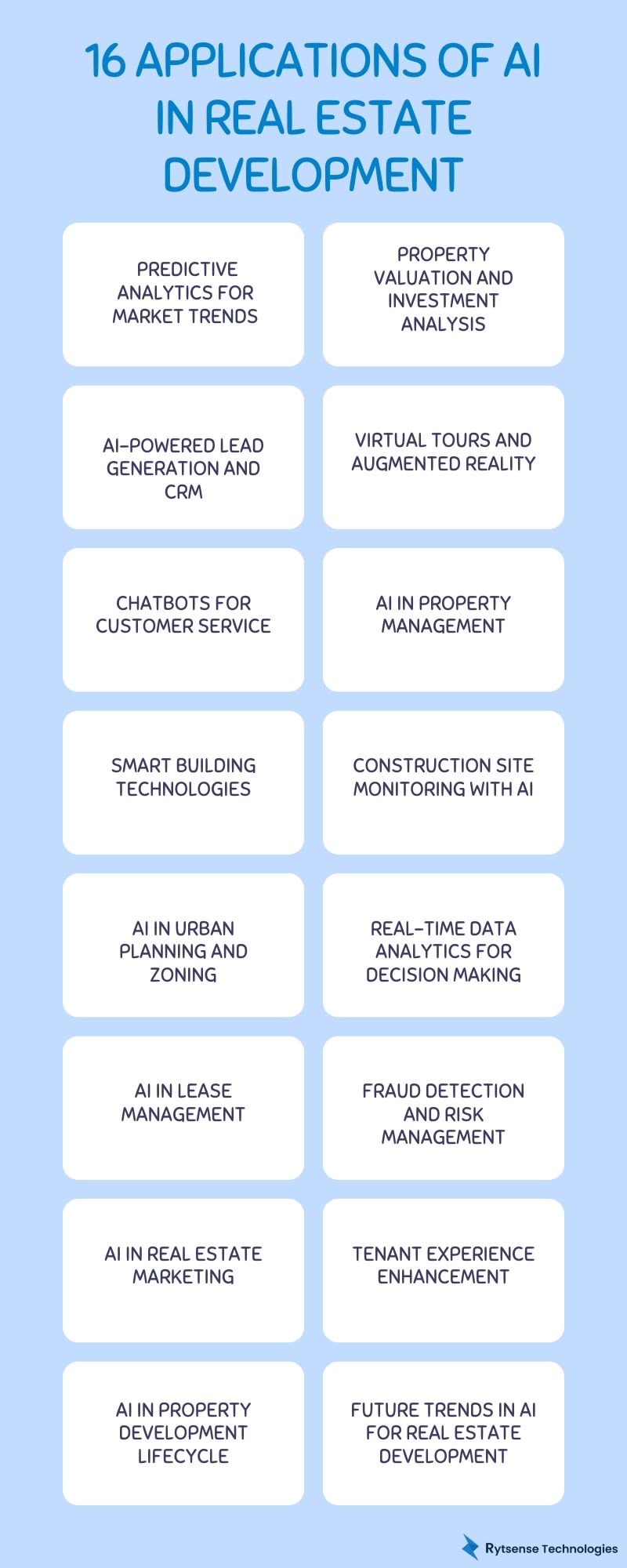
1. Predictive Analytics for Market Trends
| Market Factor | AI Analysis Capability | Prediction Accuracy |
|---|---|---|
| Price Trends | Historical data + market indicators | 85-92% |
| Demand Patterns | Consumer behavior + demographics | 80-88% |
| Supply Dynamics | Development pipeline + zoning | 75-85% |
| Investment Opportunities | Multi-factor analysis | 78-86% |
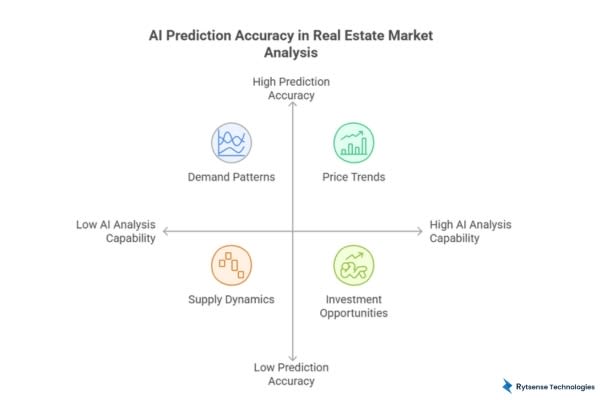
2. Property Valuation and Investment Analysis
AI approaches to valuation will continue to update as new information becomes available, thus "always" reflecting the property on the "current market". This gives both investors and developers accurate, up-to-date information to make informed enough investment decisions.
3. AI-Powered Lead Generation and CRM
Also, machine learning algorithms score prospects on how likely they are to convert, that helps sales teams prioritize where to spend their time and efforts on less than ideal opportunities. This targeted and higher-quality approach leads to improved conversion rates and overall sales efficiency.
4. Virtual Tours and Augmented Reality
Advanced rendering technologies produce photorealistic environments to showcase properties in varying degrees of light and options for furnishing and from multiple views to replicate the in-person experience. This capability is valuable, especially with sales created before home construction is completed and for international purchasers who experience challenges visiting properties in person.
5. Chatbots for Customer Service
Today's chatbots utilize natural language processing to analyze and respond to complex inquiries with relevant and helpful responses. The chatbots learn from the conversations it has daily and continue to improve the customer experience.
6. AI in Property Management
7. Smart Building Technologies
The systems monitor occupancy, adjust ambient lighting, control climate and security systems, and manage maintenance schedules. The combination of smart building systems will create more livable, efficient, and sustainable environments.
8. Construction Site Monitoring with AI
AI-enabled systems are checking visual data and determining if construction activities align. They get along with approved plans, uncover safety violations, and predict delays or quality issues before they arise. These systems ensure that the project is in compliance, track real-time results, to provide transparency, accountability, and assurance that the project meets the required standards.
9. AI in Urban Planning and Zoning
AI modeling can predict the impact of various alternative developments on traffic, infrastructure, available resources in the community, etc. This also allows planners to make educated decisions regarding development and community health and well-being balancing the needs of development with community health and well-being.
10. Real-Time Data Analytics for Decision Making
Real-time analytics will allow developers to adjust to changing conditions as they happen, to allocate resources most efficiently, and to make AI-powered decision making for developers based on the best available information, rather than based on information that has historic reliability.
11. AI in Lease Management
The intelligent lease management tools powered by AI cut down the time to lease a property, while improving the quality of the tenant and optimizing the rental pricing based on current market conditions.
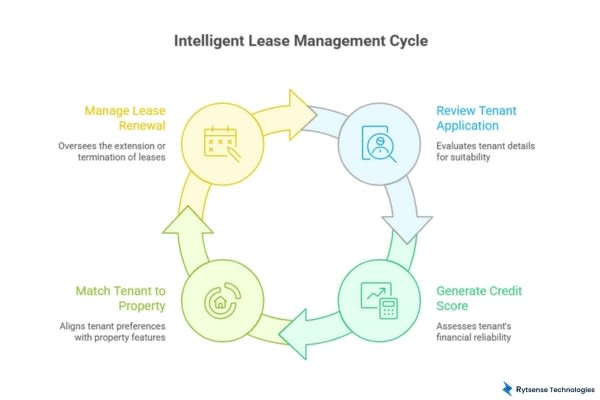
12. Fraud Detection and Risk Management
Additionally, they will recognize anomalies to pricing, inconsistencies in supporting documents, and unusual patterns of behavior that suggest fraud, or fraud operations, such as money laundering. In this way, these systems protect developers, investors, and legitimate buyers from the fraud of others.
13. AI in Real Estate Marketing
Machine learning in property management may optimize ad campaigns in real time, by adjusting audience targeting parameters, budget allocation, and creative content to maximize engagement and rates of conversion.
14. Tenant Experience Enhancement
AI-enabled smart building systems can learn tenants' preferences over time, monitor these patterns, and automatically adjust its environmental conditions. This technology will recommend personalized services, and anticipate tenant needs based upon prior usage patterns and behavior.
15. AI in Property Development Lifecycle
| Development Phase | AI Application | Key Benefits |
|---|---|---|
| Site Selection | Location analysis | Optimal site identification |
| Design | Generative design | Cost-effective layouts |
| Construction | Progress monitoring | Timeline optimization |
| Marketing | Targeted campaigns | Higher conversion rates |
| Operations | Smart systems | Reduced operating costs |
16. Future Trends in AI for Real Estate Development
Generative AI Development Services enable the creation of authentic architectural designs, optimization of a space of a property, and highly personalized property suggestions based on a user’s objectives and desires.
Discover how AI-powered automation can streamline every phase of your real estate lifecycle.
Real-World Use Cases of AI in Real Estate Development
Major developers employ AI to conduct site selection and optimize their development portfolios. Site selection solutions gather and combine predictive analytics for high growth areas and favorable market conditions to make determinations about new development applications. These systems utilize big-data analytics for demographic trends, criteria for planned infrastructure, and general economic indicators to advise optimal projects.
Property management firms are using AI systems to drive down operating expenses while enhancing tenant engagement with the property. In these cases, AI systems have been able to cut maintenance expenses by 40-60% and improve response times.
Challenges and Considerations in Implementing AI
Organization integration with existing organization technology setup and processes requires careful planning and investment in the organization's technological infrastructure. It will also be necessary to address staff training and change management, as this will all be part of the value proposition of the new technology setup.
Privacy and security will also be highlighted, as organizations will be integrating technology that uses sensitive customer and business information, this presents an entirely different set of management considerations. Using privacy and sensitive data is what the AI technology is best at delivering. Organizations will need to put security measures in place and be in compliance with various data related guidance and/or regulatory frameworks.
In terms of costs, organizations will need to consider the upfront investment of implementation, savings from changes to business models, ongoing maintenance, and having someone with technical expertise who is available or contracted by the organization to be available when new issues arise. Organizations will want to ensure there is consideration of a return on investment, when determining whether they can execute the timeline for development.
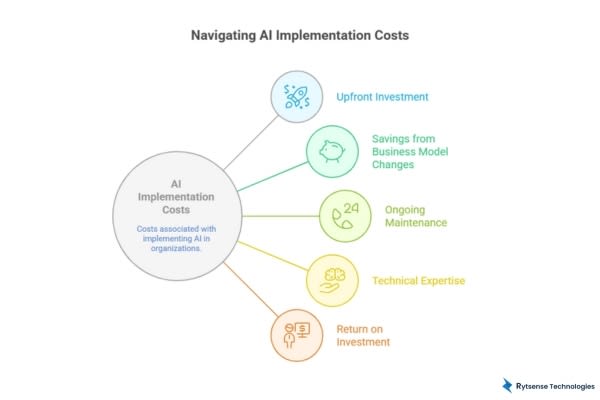
Prepare your business for the AI-powered future of real estate.
The Future Impact of AI on Real Estate Development
By 2025, the impact of how AI will change the built environment will become undeniably more observable, driving efficiency, customer experience, and workflow in operation. Studies are reporting results in productivity and technology advancement in real estate enhancements to the order of a 7.3% change in productivity increase, and a 6.9% increase in customer satisfaction and experience over a given period.
AI will pave the way for the development of true smart cities where buildings will be able to communicate with each other and with city infrastructure in order to maximize resources, limit environmental impact, and provide for a better standard of living for all occupants. Connectivity will be a component of the connectivity, whereby the shared experiences will encourage more sustainable development for future regeneration and optimize collaborative workflows of their occupants. More mindfully connected cities may allow for the most well-deserved quality urban environments - more intelligently and sustainably designed environments.
How Generative AI Is Shaping Real Estate Market Trends
The upward trend across the categories illustrates the growing utilization of generative AI tools, such as virtual staging, and 3D property designs, as a leading solution to provide efficiencies and customer engagement. These products demonstrate real-world AI value in providing an excellent customer experience and lowering the cost of traditional content generation.
AI Agent Development Services can help develop intelligent agents to undertake complicated tasks in real estate without relying on a human to drive the transaction. In their current phase, AI skills can conduct information searches of properties, negotiate terms, schedule showings of the property, and in some cases, complete some of the transaction process with little human engagement.
Create Custom AI Solutions for Real Estate with Rytsense Technologies
Machine Learning Development Services make it possible for predictive models, recommendation engines, and automated decision systems to optimize real estate management. The service incorporates all aspects needed for machine learning: data preparation, model design, testing, deployment, and ongoing maintenance and optimization.
Custom AI solutions take a business problem and a business opportunity into consideration by developing the implementation in a manner that ensures organization goals are met and intended outcomes delivered in measurable results. Professional development teams will collaborate with real estate experts to understand needs and develop AI solutions that provide real value.
Conclusion
Organizations that do not act on these technologies will eventually be left behind as the real estate sector adapts to technological change. There will never be the best time to start using AI in real estate development, but the window for opportunity for groups to capitalize on the opportunities is large.
When planning, investment in technology and training are taken into account for using AI in real estate development the change in outcomes will justify the effort and returns will sustain the architecture for future growth and success.
Transform your real estate vision into intelligent, data-driven success stories.
Meet the Author

Karthikeyan
Co-Founder, Rytsense Technologies
Karthik is the Co-Founder of Rytsense Technologies, where he leads cutting-edge projects at the intersection of Data Science and Generative AI. With nearly a decade of hands-on experience in data-driven innovation, he has helped businesses unlock value from complex data through advanced analytics, machine learning, and AI-powered solutions. Currently, his focus is on building next-generation Generative AI applications that are reshaping the way enterprises operate and scale. When not architecting AI systems, Karthik explores the evolving future of technology,where creativity meets intelligence.